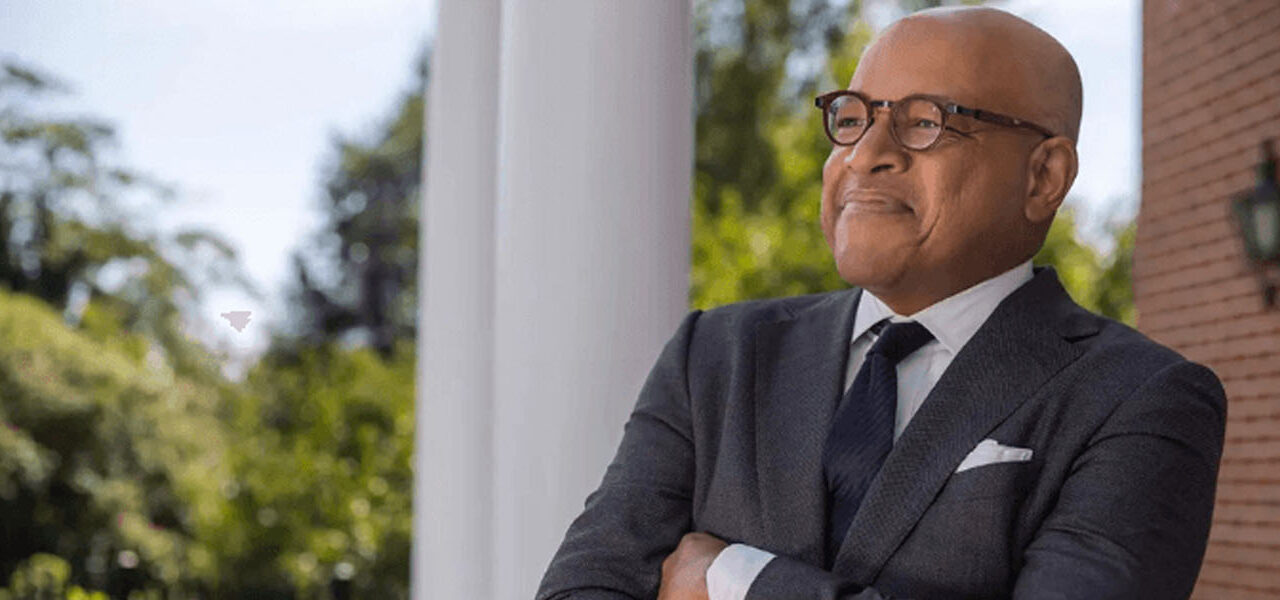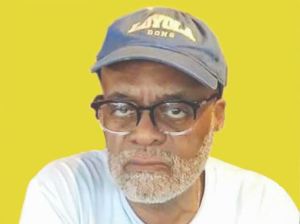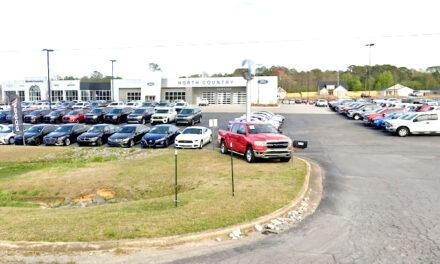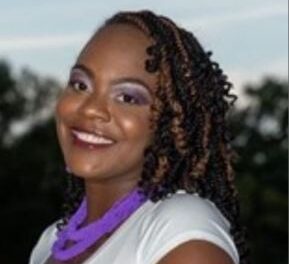By Mirtha Donastorg | The Atlanta Tribune
Tucked away in a corner of the Four Seasons lobby in downtown Austin, as catering services walk by with carts of tinkling crystal, David Thomas is telling a bit of his life story.
“I wanted to go to Morehouse from the time I was 10,” the now-President of Morehouse College told The Plug. “I only applied to two schools, got into both. One was a school I had never heard of called Yale, the other was Morehouse. Morehouse didn’t give me any money, Yale gave me a full ride.”
We are chatting on the first evening of SXSW EDU, a four-day whirlwind of panels, films, mixers and Q&As dedicated to all things education. Earlier in the day, Thomas sat on stage in a large auditorium, discussing HBCUs and the future of work to a rapt audience, where he touched on how Morehouse has evolved because of the pandemic and how he avoids entering corporate partnerships that he described as “transactional drive-bys.”
Morehouse has had a renaissance over the past three years, starting in 2019 when billionaire philanthropist Robert F. Smith announced he was paying off the loans of that year’s entire graduating class — at their commencement ceremony.
Most recently, Morehouse has embarked on a $500 million capital campaign that Thomas hopes will make the school need-blind, rendering Smith’s type of gift unnecessary for future classes.
“I was from a family where nobody had been to college and my estimated parents’ contribution was zero,” Thomas explained. Because he couldn’t afford to pay for Morehouse, he ended up attending Yale College over his dream school.
For nearly 40 minutes, Thomas delved into what being need-blind would mean for Morehouse’s prospective students as well as how Morehouse has adjusted to online education during the pandemic, how he considers partnering with companies that have allegations of discrimination against them and his 10-year vision for the HBCU.
This interview has been edited for clarity and length.
Mirtha Donastorg: How long have you been president?
President David Thomas: I have been the President of Morehouse College for four years, two months and one week.
Oh, wow. So you’re almost near your four-year, three-month anniversary. You could have a degree from Morehouse right now.
That is true, this class that’ll graduate in May will be the first class I’ve been with all four of their years. Because I came in January of 2018.
So halfway through your current tenure at Morehouse, the pandemic happened, which you were saying on the panel necessitated evolving and changing. What has that looked like for Morehouse?
It has looked like building the capacity to leverage online to provide high-quality education. We require all of our faculty to become certified in online education.
We started requiring that in the summer of 2020. And so we now have a faculty that is actually trained in online education and instruction, which just expands our ability to create high-quality learning programs. Eighty percent of our on-campus classes are taught on campus, but we have about 20 percent of our faculty who’ve decided to either continue teaching online or teaching in a hybrid format.
And the hybrid formats have proven to be very successful. That’s for our residential students. It’s made it much easier for us to get faculty engaged in our online degree program.
Was that a plan that you all had before the pandemic and it was accelerated?
By the time I had finished my first semester there, it was very clear to me that we needed to be looking at online [education]. And then the pandemic hit and that accelerated our consideration and pace of getting there. We were thinking about it before the pandemic and talking about it before the pandemic.
Now it wasn’t just the pandemic happened, but a few months later, summer of 2020, the racial reckoning and an influx of money and attention to HBCUs. What did that look like for Morehouse?
So, you know, it’s an interesting question because for Morehouse, an event had happened in the spring of May ‘19, which brought lots of attention and also inspired donations.
And that was Robert Smith paying off the entire graduating class?
That was an almost $40 million gift.
Did you know that was gonna happen beforehand?
No.
So it was a surprise to you too.
What he did was a surprise. You know, I had an inkling he was going to do something because he had already been a donor to the college when he visited a year earlier and he gave us a seven-figure gift. But I had no idea that he was going to announce that he essentially was going to give the college $40 million to pay off those loans.
And that was game-changing in the way I think people were thinking about support of the college and more broadly supporting HBCUs. So that was May 2019. In October 2019, Oprah Winfrey arrives, and she gives us $13 million.
The founder of Netflix had originally come to visit us in the spring of 2019. He had never been to an HBCU. He and his wife committed a million dollars. Then George Floyd happened.
[From Hastings and his wife], Spelman and Morehouse each got $40 million and then UNCF got $40 million. What you started to see happening was large seven and eight-figure gifts occurring at a number of HBCUs.
I think Robert Smith’s gift had primed the pump for philanthropists to look differently at HBCUs than they had in the past.
And now, as a result of George Floyd and the measurable racial differences in the way the pandemic was hitting communities, that had a broader, deeper effect. We saw the largest gifts in the history of the college during that post-George Floyd, pandemic period.
Now, along with the money came a lot more attention from companies. You mentioned partnerships with a purpose as being, “This is what we need to do if Morehouse is going to partner with you.” What exactly is that criteria?
That criteria is that a company engages us in a way that creates capacity and that can take several forms. So one example of it is Bank of America committed $10 million to support the Center for Black Entrepreneurship, which is a joint venture between Spelman and Morehouse.
More than half of those funds are going to endow faculty positions. Why is that important? Well, that’s important because, you know, one day, [Spelman President] Mary Smith Campbell, David Thomas, Brian Moynihan, the CEO Bank of America, we won’t be in these positions. But with endowed professorships and support to endow scholarships for students, then that effort becomes independent of personalities and independent of news cycles. That’s a partnership of purpose.
Another example is Google recruits our students. But in looking at our computer science program, we discovered that a long-time strength is the theory of computer science. But we weren’t giving our students some of the skills of software engineering that would make them highly competitive with people being trained at the schools out in Silicon Valley.
Well, instead of us having to find, probably $200,000 to $250,000 more a year to bring a faculty member to teach, Google sends people to teach at Morehouse those skills.
This year, we had one of our graduates, Ernest Holmes, who works for Google. He was actually loaned to us as a faculty member and that was powerful for our students. They could see themselves. Ernest is teaching the cutting edge of computer science and software engineering.
That’s a partnership of purpose, as opposed to showing up, hiring our students for internships and then saying ‘Gee, you know, those Morehouse students, they don’t have the latest understanding of software engineering.’ Well it’s not because they’re not smart enough, right? It’s a resource question and Google doing that is not dependent on us delivering a certain number of our students to go to Google. That’s a partnership of purpose.
How do you consider or vet companies that either have historic or recent allegations of discrimination? How do you think about Morehouse partnering with them and sending students? One big example of that is Google. So how do you look at that, sending from this kind of cocoon of Morehouse?
You know, the way we look at it, we look at it from the vantage point of how do they want to engage Morehouse? We don’t say, ‘Hey, you know, Google’s getting bad press because they fired this person who was supposed to be looking at how their software reproduces the biases in our society.’ That was a controversy.
We didn’t say, ‘Well then we can’t work with Google.’ What we did say was we only want to work with Google if Google is going to invest in Morehouse in a way that builds capacity for us. Otherwise, you know, it’s what I refer to as a transactional drive-by. So now even before some of these issues around Google were hitting the press, Google was already engaged with us.
Same thing, we’ve had a long-standing relationship with JP Morgan Chase. We don’t say because JP Morgan Chase has had some issues related to the way they give mortgages then we’re not going to work with them. And to be quite honest, you’d be hard-pressed to find a company that doesn’t have a skeleton in its closet as it relates to issues of racial equity.
So we look at it from a vantage point of what kind of investment are they willing to make in Morehouse. Are they willing to make an investment in a way that builds our capacity to sustain it if they disappear?
Five, 10 years from now, how will you measure the success of this moment of more attention and more money to HBCUs?
One, what we’ve created has turned out to be sustainable.
Two, we are winning more than our fair share of the applicant pool that we want.
Oh, like you’re accepting them and they are accepting you back?
We’re accepting them and they are accepting us. Our applications continue to rise. And you know, for Morehouse that also means that we’ll be more international.
Like having more international students?
Having more international students, having more of our students have international experiences.
Ten years from now, we’ll see as a product of our efforts in entrepreneurship, more scalable businesses being started by students who’ve come through our program.
What we’ll also see is our students not just creating businesses, but participating in all parts of the ecosystem that supports entrepreneurship. And that’s one of the things about the way we’re developing the Center for Black Entrepreneurship is it’s not just about going out, starting your business. It’s really about opportunities to understand that ecosystem.
And 10 years from now, for Morehouse in this period, we will have had the kind of success in fundraising that by 2030 Morehouse is need-blind.
What exactly do you mean by need-blind?
Need-blind means that we calculate what you and your parents can pay, what you may have coming to you from federal grants, and we fund the rest.
What we will probably do is set a limit on how much loans any student would have to take, and for students from a particular economic stratum, like from families of four that make less than $60,000, you can go through Morehouse debt-free.
And you know, that puts us in the business of competing on quality of experience, quality of education, quality of opportunities with the best schools in the country.
So, if you don’t want to come to Morehouse, it won’t be because of money.
The post A Debt-Free Morehouse Education: President David Thomas Explains His Vision for the Future appeared first on Atlanta Tribune.
The post A Debt-Free Morehouse Education: President David Thomas Explains His Vision for the Future appeared first on NNPA Education Public Awareness Program.











